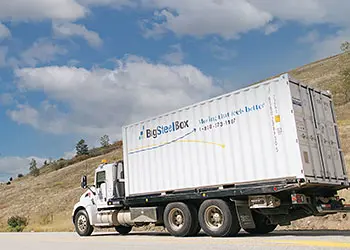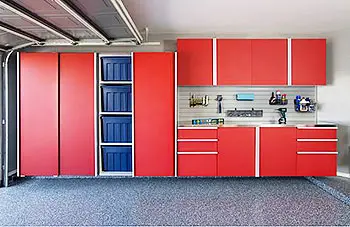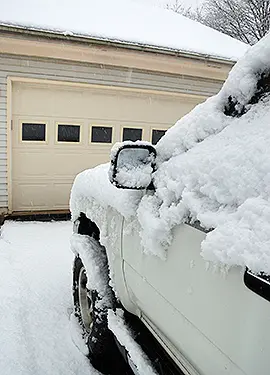
Grandfather and grandchildren with classic car
Shipping Containers vs Garages for Vehicle Storage
For those who own a vehicle that isn’t used year-round, or those who have several vehicles that need to be stored on and off, it’s important to find a secure way to keep those vehicles clean and safe while in storage.
Living in Canada means most of us deal with extreme weather throughout the year, so protecting vehicles from the wear and tear of heat, cold, wind, hail and anything else that could cause damage is important. Plus, the last thing you want to find is that rodents have made their way into your storage unit or garage at some point and caused damage to your vehicle.
If you’re not sure which type of vehicle storage would work best for you, read on for some pros and cons of storing vehicles in a shipping container vs. a garage.
Advantages of Storing Vehicles in Shipping Containers
 When it comes to storing vehicles, one innovative option that has gained popularity in recent years is utilizing shipping containers. These steel structures, originally designed for transporting goods across oceans, offer a unique solution for securely housing vehicles. Here are a few advantages to storing your vehicle in a shipping container:
When it comes to storing vehicles, one innovative option that has gained popularity in recent years is utilizing shipping containers. These steel structures, originally designed for transporting goods across oceans, offer a unique solution for securely housing vehicles. Here are a few advantages to storing your vehicle in a shipping container:
Security
Shipping containers are built to withstand harsh conditions and provide exceptional security. Made from solid steel, they offer robust protection against theft, vandalism, and natural elements. When vehicles are stored in containers, they are shielded from potential damage caused by weather, UV rays, and environmental hazards, reducing the risk of wear and tear.
Versatility
Shipping containers come in various sizes, making them versatile for storing different types of vehicles, from motorcycles to cars and even boats. Moreover, containers can be modified to include extra doors, windows, insulation, vents, and heating and cooling systems, just to name a few.
Affordability
Compared to traditional storage options like garages or dedicated facilities, using shipping containers can be a cost-effective solution. After the initial investment of purchasing a container there are no recurring monthly fees, and you have the flexibility to place the container on your property or in a storage facility of your choice.
You can also opt to rent a shipping container for the months you need it. This allows you to change the size or location of the container, and avoids any large one-time costs.
Mobility and Durability
 One of the significant advantages of storing vehicles in shipping containers is their mobility. If you need to move or transport your vehicle to a new location, you can simply load the container onto a truck or train, ensuring that your vehicle remains protected throughout the journey. This convenience is particularly beneficial for car collectors, enthusiasts, or frequent travellers.
One of the significant advantages of storing vehicles in shipping containers is their mobility. If you need to move or transport your vehicle to a new location, you can simply load the container onto a truck or train, ensuring that your vehicle remains protected throughout the journey. This convenience is particularly beneficial for car collectors, enthusiasts, or frequent travellers.
Disadvantages of Shipping Containers for Vehicle Storage
Much like any storage method, there are disadvantages to consider as well when deciding if you should store your vehicle in a shipping container:
Limited Space and Accessibility
While shipping containers offer versatility, they have limited space compared to traditional garages or warehouses. Depending on the container’s size (most 20′ and 40′ shipping containers are 8′ wide), it may not accommodate larger vehicles or multiple vehicles simultaneously. You’ll need to ensure that the container’s dimensions align with the size of your vehicle.
Another potential drawback of using a container for vehicle storage is limited accessibility. If you’re planning to store a hobby vehicle that you’ll want to work on, you will likely encounter challenges in terms of maneuverability and the ability to access a vehicle for maintenance or repairs while it’s inside the shipping container.
Ventilation and Moisture Control
Shipping containers are not originally designed for vehicle storage, so ventilation can be a concern in some cases. Without proper ventilation, condensation can accumulate, leading to the formation of mold, mildew, and rust should you track in water when bringing your vehicle in and out of the container.
To mitigate this issue, it’s advisable to invest in ventilation, a dehumidifier, or other moisture-absorbing products to maintain a suitable environment for your vehicle. It’s also recommended to ensure that the fuel tank of the vehicle is empty before storing it in a container because some flammable materials stored in shipping containers may release vapours that can accumulate in the container.
Note: All new BigSteelBox shipping containers come equipped with four small vents (two on each side).
Permits and Regulations
Before opting to store a vehicle in a shipping container, it’s recommended to check local regulations and obtain any necessary permits. Some municipalities may have specific guidelines regarding container placement on residential or commercial properties, which could restrict your options or involve additional costs.
Advantages of Storing Vehicles in a Garage

Garages offer numerous advantages for vehicle storage, and for many car owners, a garage is more than just a place to park their vehicles; it’s a sanctuary. Here are a few advantages to using a garage to store your vehicle:
Security
A well-built garage shields your vehicle from these elements, reducing the risk of damage and preserving its aesthetic appeal. In addition, a closed and locked garage keeps your vehicle out of sight, which is a deterrent to thieves, reducing the chances of your car being stolen or vandalized.
Convenience and Accessibility
If your garage is attached to your home and you use the stored vehicle occasionally, it provides a sheltered area to access the car, load and unload items like groceries, and perform maintenance tasks comfortably, regardless of the weather.
Single-car garages are typically 12′ wide, so most garages will give you enough room to comfortably work on either side of an average sized car. So, if you’re storying a hobby car that you like to access occasionally, a garage is the best storage option
Disadvantages of Storing Vehicles in a Garage
While a garage is a great option to protect your vehicle against the elements, theft, and damage, they also come with limitations:
Limited Storage Space and Lost Storage Opportunities
 Depending on the size of your garage and the number of vehicles you own, it may be challenging to accommodate all your cars, especially if you have multiple vehicles.
Depending on the size of your garage and the number of vehicles you own, it may be challenging to accommodate all your cars, especially if you have multiple vehicles.
Using a garage solely for vehicle storage means forfeiting potential storage space for other belongings. If you have limited storage options in your home, you may find it challenging to accommodate tools, outdoor equipment, or seasonal items that would typically be stored in a garage. In such cases, you might have to consider alternative storage options or invest in a larger garage.
Costly Installation and Maintenance
Building or upgrading a garage can be a significant investment. The cost of construction, insulation, electrical work, and maintenance can add up quickly. Additionally, regular maintenance like cleaning, organizing, and potential repairs can consume both time and money.
Lack of Ventilation
Garages often lack proper ventilation, which can lead to humidity buildup and poor (even harmful) air quality. High humidity levels can cause moisture-related issues such as mold growth, musty odours, and even potential damage to the vehicle’s interior. If your garage is attached to your home, poor air circulation in a the garage can risk the air quality inside your home as well. It’s crucial to ensure adequate airflow and consider ventilation solutions to mitigate these risks.
Finding the Right Option to Fit Your Vehicle Storage Needs
When choosing a storage option for your vehicle, be sure to weigh all the pros and cons of options like garages versus shipping containers. In the end, it will likely come down to how often you need to access your vehicle, the size of your vehicle, your budget, and the type of property you have to house the garage or storage container.
If you think a BigSteelBox storage container or a modified shipping container would work for your vehicle storage needs, we’d love to help. Give us a call at 1-800-373-1187 or request a quote online.




